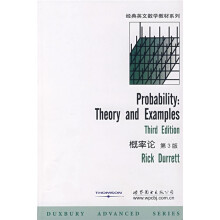Introductory Lecture
1 Laws of Large Numbers
1. Basic Definitions
2. Random Variables
3. Expected Value
a. Inequalities
b. Integration to the limit
c. Computing expected values
4. Independence
a. Sufficient conditions for independence
b. Independence, distribution, and expectation
c. Constructing independent random variables
5. Weak Laws of Large Numbers
a. L2 weak laws
b. Triangular arrays
c. Truncation
6. Borel-Cantelli Lemmas
7. Strong Law of Large Numbers
8. Convergence of Random Series
9. Large Deviations
2 Central Limit Theorems
1. The De Moivre-Laplace Theorem
2. Weak Convergence
a. Examples
b. Theory
3. Characteristic Functions
a. Definition, inversion formula
b. Weak convergence
c. Moments and derivatives
d. Polyas criterion
e. The moment problem
4. Central Limit Theorems
a. i.i.d, sequences
b. Triangular arrays
c. Prime divisors (Erd0s-Kac)
d. Rates of convergence (Berry-Esseen)
5. Local Limit Theorems
6. Poisson Convergence
a. Basic limit theorem
b. Two examples with dependence
c. Poisson processes
7. Stable Laws
8. Infinitely Divisible Distributions
9. Limit theorems in ad
3 Random Walks
1. Stopping Times
2. Recurrence
3. Visits to 0, Arcsine Laws
4. Renewal Theory
4 Martingales
1. Conditional Expectation
a. Examples
b. Properties
c. Regular conditional probabilities
2. Martingales, Almost Sure Convergence
3. Examples 236
a. Bounded increments
b. Polyas urn scheme
c. Radon-Nikodym derivatives
d. Branching processes
4. Doobs Inequality, Lp Convergence Square integrable martingales
5. Uniform Integrability, Convergence in L1
6. Backwards Martingales
7. Optional Stopping Theorems
Markov Chains
Ergodic Theorems
Brownian Motion
Appendix:Measure Theory
References
Notation
Normal Table
Index

 缺书网
缺书网 扫码进群
扫码进群




